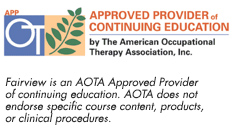|
MAKING SENSE OF SENSORY: How Sensory-Motor Issues Affect the Development of SpeechDate: Friday, May 17th, 2019 Audience: Pediatric PT/PTA, OT/COTA, SLP Contact hours: 6.0
This course is offered for 0.60 ASHA CEUs ( Professional area, Intermediate level)
AOTA Classifications Codes: Category 1:Domain of OT, Category 2: Occupational Therapy Process Course Fee: $195 Instructor: Cari Ebert, M.S., CCC-SLP, is a pediatric Speech-Language Pathologist in private practice in the Kansas City, Missouri area. She received her bachelor’s degree from the University of Iowa in 1993 and her master’s degree from Southern Illinois University at Carbondale in 1995. Cari is a therapist, consultant, author and nationally recognized speaker who gets paid to do what she loves most…TALK! She works exclusively with young children, birth to age five, and their families and believes that early intervention is the key to future success. Cari’s son has autism spectrum disorder, apraxia and sensory processing disorder. This allows her to engage audiences both as a professional and as a parent of a child with special needs. She has an energetic personality and this translates to a high-energy speaking style. Join Cari as she explores important issues for enhancing the development of young children…you’ll be glad you took the time! Course Description: Young children with special needs will benefit when practitioners work together as a cohesive unit to assess and treat the whole child. This transdisciplinary team approach requires pediatric therapists and educators to understand and synthesize knowledge from the fields of speech-language pathology, occupational therapy, physical therapy and education. Understanding that sensory input drives motor and behavioral output provides the foundation for this course. The way young children take in and respond to sensory information can significantly impact their learning, development and behavior. Pediatric therapists and early childhood educators can gain confidence and competence by increasing their knowledge related to the impact of sensory-motor issues on speech, language and social development. This one-day course will provide an overview of the external and internal sensory systems along with observable characteristics of sensory over-responsivity, sensory under-responsivity and sensory craving behaviors. Participants will examine the benefits of using a multisensory therapy approach to help young children interact more effectively with their environment. Objectives: Upon completion of this course the participants will be able to:
Agenda: 7:30-8 am - Registration/Continental Breakfast 8-8:30 am - Understanding Sensory Processing
8:30-10 am - Understanding Sensory Processing Disorder (SPD)
10-10:15 am - BREAK 10:15-11:30 am - Overview of the Sensory Systems
11:30-12:30 pm - LUNCH 12:30-1 pm - Communicative Functions of Behavior
1-2 pm - Supporting the Dysregulated Child
2-2:15 pm - BREAK 2:15-3:30 pm - Documentation
Application and Case Studies Q & A |



